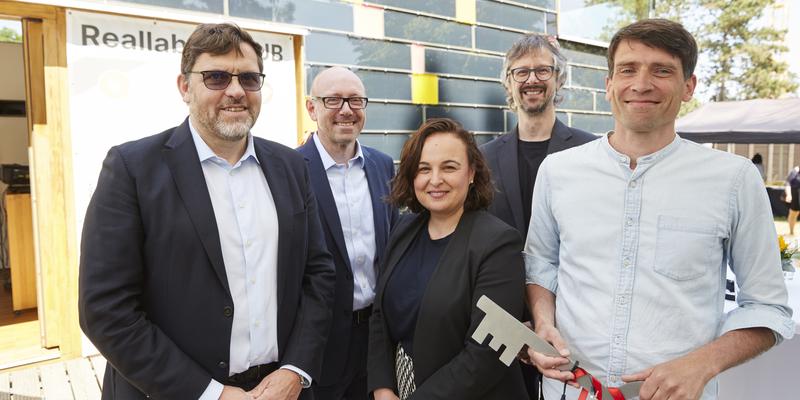Research for Disaster Relief
Former Solar Decathlon house reopened as research laboratory eHUB at TU Darmstadt
Former Solar Decathlon house reopened as research laboratory eHUB at TU Darmstadt

Last Friday, the energy self-sufficient smart home “eHUB” was opened on the Lichtwiese campus of Darmstadt Technical University. The building is the former Solar Decathlon House, which was renovated and technically expanded by the LOEWE Center emergenCITY. In the future, technology for crisis and disaster management will be researched in the research laboratory, which is equipped with numerous solar cells - especially for long-lasting supraregional power outages. For example, the possibility of powering up an emergency communication system in isolated operation using electricity from the in-house photovoltaics and receiving and forwarding messages from the disaster control team will be investigated.
In a ceremonial act, the building was inaugurated and presented by the emergenCITY team. With its reopening as an eHUB, after a year and a half of renovations and upgrades, the building now offers the opportunity to test new technologies in a real crisis setting. This is because the building functions as a real-life laboratory that runs through operations under real conditions during blackouts lasting several days. For example, ranges, runtimes and data volumes of emergency communications are tested when the building is cut off from the power grid. By researching important solutions for energy self-sufficiency here, but also for crisis prevention, LOEWE research on the TU Darmstadt campus is making an important contribution to a secure and social energy transition.
“TU Darmstadt contributes to the solution of essential problem with education, research and exchange. We are thought leaders:in, connectors:in, role models,” said Professor Dr.-Ing. Peter Pelz, Vice President for Digitalization, Sustainability and Infrastructure at TU Darmstadt. “The LOEWE project emergenCITY is a beacon for us. It combines the research fields of Information and Intelligence with Energy and Environment. The scientists are working on strategies, methods, technologies and governance concepts to be able to cope with crisis situations. The eHUB is typical for us as TU Darmstadt. We do not stop at thinking. We validate in real laboratories. Only then do we become a role model for society.”
Ayse Asar, State Secretary at the Hessian Ministry of Science and the Arts, said: “In an increasingly complex world, universities play a crucial role as real laboratories for innovative solutions to the pressing challenges of our time. Since 2020, the LOEWE center emergenCITY has been conducting research on resilient infrastructures of digital cities that can withstand crises and disasters. Here, scientists across universities and disciplines are investigating the question of how our modern cities can remain robust and safe in the event of crises and disasters in sensitive areas such as energy, transport, health and administration. I am pleased that the Reallabor eHUB translates research results into concrete applications and makes them tangible for citizens. In this way, the LOEWE center acts as a catalyst for social change.”
Several disciplines work hand in hand. The building was converted and upgraded by a team from the Department of Architecture (Institute of Design & Urban Development), while the smart home and communication technology is contributed by experts from the Departments of Electrical Engineering and Information Technology (Department EINS), Mechanical Engineering (Institute of Flight Systems and Automatic Control) and Computer Science (SEEMOO Lab), and the TU’s Institute of Political Science focuses on the social context.
In the future, the eHUB will not only research new technologies for energy self-sufficiency of buildings, but also develop concepts on how such a modern building itself can be used as an information center, for emergency communication, as an emergency power source or as a command center. The neighborhood should also benefit from buildings like the eHUB and be supplied here with the most necessary electricity and important information during a crisis. Current news about the crisis, for example, will be shown to the population directly on displays in the facade of the building.
Several eHUBs distributed across the city area provide a network in the event of a crisis. At the same time, solar-powered advertising pillars could relay supplementary messages or indicate to the urban population where the next eHUB provides electricity so that at least the cell phone can be charged here, or where medicines, drinking water and food are accessible. Another research project for the crisis supply of the future is drones that collect information, relay messages or deliver the essentials. They can find landing sites on the eHUB and recharge their batteries there. During a blackout, such smart buildings can maintain the digital infrastructure in emergency operation.
The former Solar Decathlon house “surPUShome” was designed and built in 2009 by student teams of architects and electrical engineers before it, like the neighboring Solar House from 2007 before it, was packed and sent across highways and the Atlantic Ocean to Washington for the Solar Decathlon competition on a very successful journey. Here, the two buildings emerged as winning houses in terms of energy efficiency, aesthetics and comfort in the prestigious solar competition. This was followed by stops in Essen and Stuttgart, so that the houses have already been able to inspire many international visitors:inside with a wide variety of backgrounds. Since its return to the TU Darmstadt, the surPUShome remained unused for a long time until 2020, when the emergenCITY team came up with the idea of using the building as a real laboratory for research. After a year and a half of renovation and technical expansion, it is now ready for crisis management research under the new name “eHUB”.